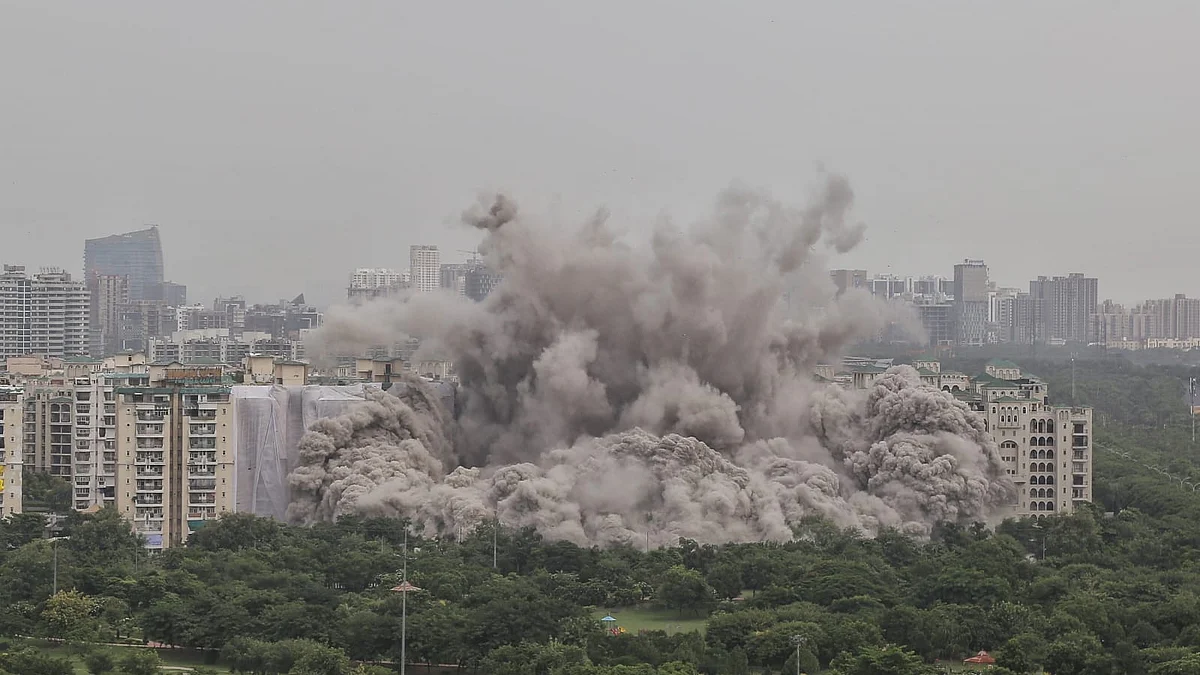Supertech demolition: Environmentalists call for regular air monitoring, waste segregation
The demolition of these towers has generated significant quantities of rubble, which resulted in production of gigantic amounts of dust

Following the demolition of the Supertech twin towers in Noida, steps should be taken for regular air monitoring, and waste segregation to minimise environmental impacts, say environmentalists.
"The Supreme Court has reaffirmed the belief of the common masses that there is no space for illegalities and criminal, exploitative tendencies among the business-makers," said lawyer and environmentalist Akash Vashishtha.
The demolition of these towers has generated significant quantities of rubble, which resulted in production of gigantic amounts of dust, as a result of which PM10 in the areas within its close vicinity is likely to be recorded much higher.
The PM2.5 levels would also see a spike but not as much as PM10 (being larger particles than the former), he says.
The UPPCB needs to monitor the air quality levels of the site and whole area, post demolition, till at least for a month and a half (because NCR starts witnessing spurt in the air pollution levels late October onwards), so as to ensure that pollution from demolition does not coincide with the annual pollution factor, he suggested.
The UPPCB must oversee and ensure that the provisions of the C&D Waste Rules are strictly implemented. The CPCB must ensure that there are no lapses by the AUPPCB and Noida Authority.
The Noida Authority needs to ensure that there is proper segregation of the waste, into concrete, steel, soil, wood, glass, plastics, bricks and mortar etc, as provided under the Construction and Demolition Waste Management Rules, 2016, under the Environment (Protection) Act, 1986.
After segregation, they must be carefully transported under covered sheets, to the C&D waste processing site, where another round of segregation must take place. The Noida Authority must incentivise reuse of the extracted materials in the construction activity, including non-structural concrete, colony and rural roads.
Water sprinklers, spray guns must remain installed in adequate numbers in and around the site and used regularly till the disposal of the entire demolition waste. The areas in the vicinity of the towers must be greened/landscaped, to contain the dust, he said.
The entire demolition exercise must be viewed by the Noida Authority, UPPCB, CPCB and the demolition engineering company, Edifice Engineering) as an opportunity.
It gives Noida Authority an opportunity to upscale, upgrade and modernise its C&D waste site while UPPCB also gets a first hand chance to implement and enforce the provisions of the said rules.
The engineering companies may also get to explore the best demolition technologies available in the world and adopt them in India, the environmentalist added.
Follow us on: Facebook, Twitter, Google News, Instagram
Join our official telegram channel (@nationalherald) and stay updated with the latest headlines
